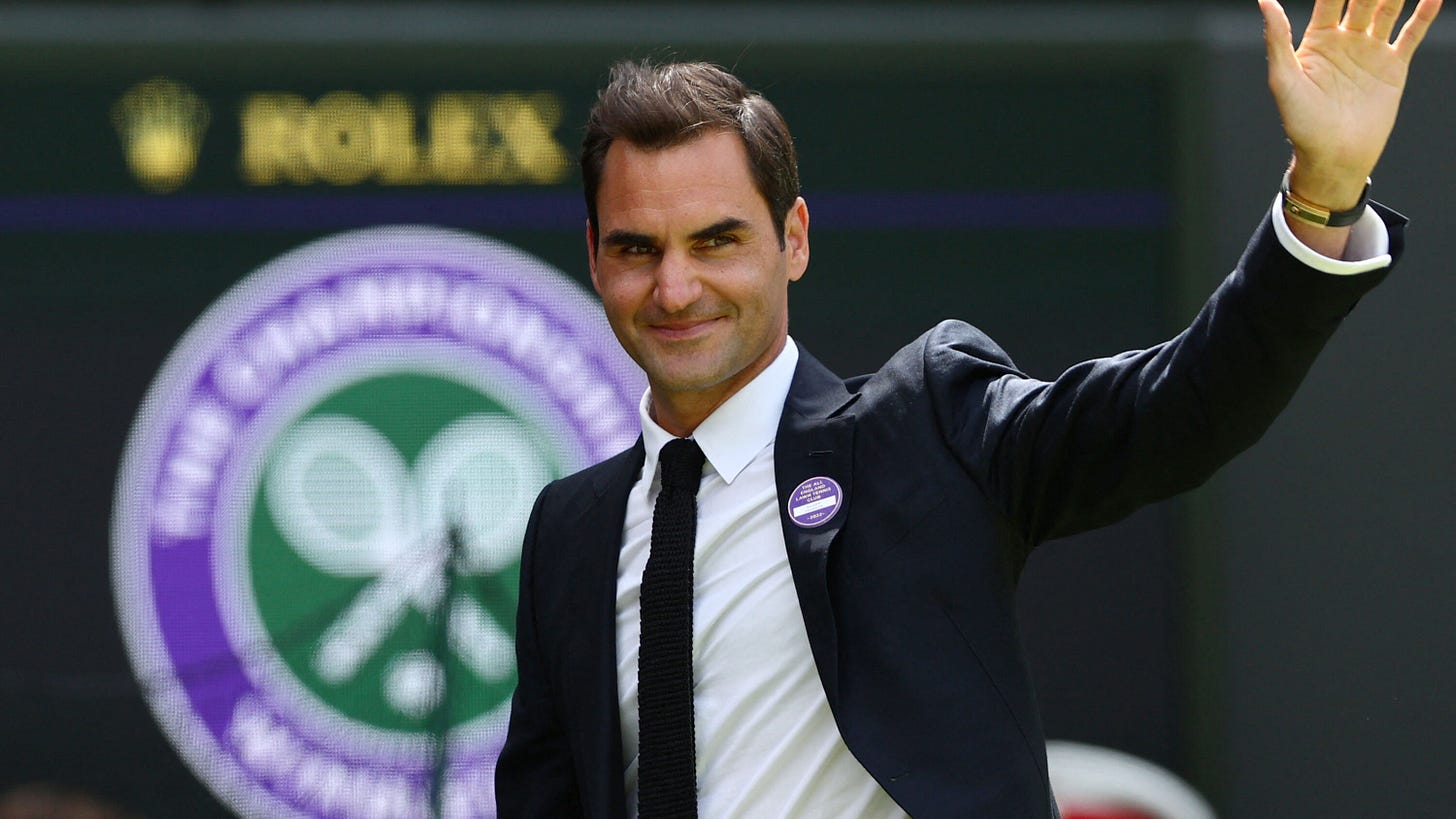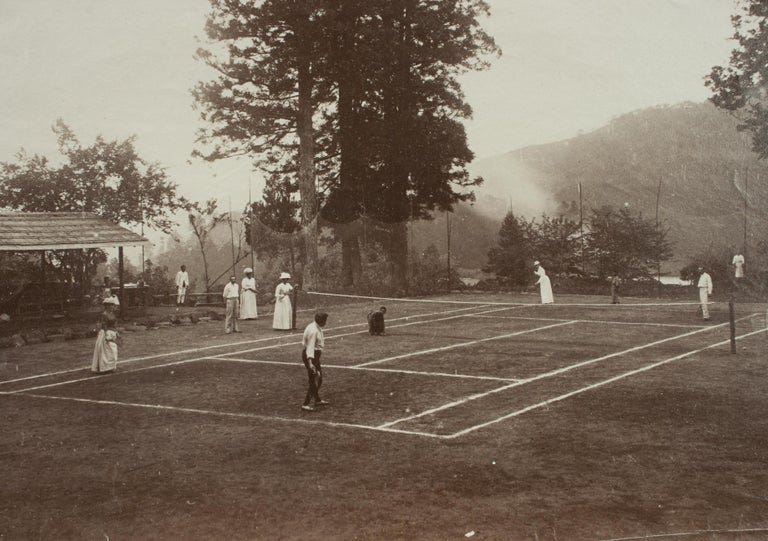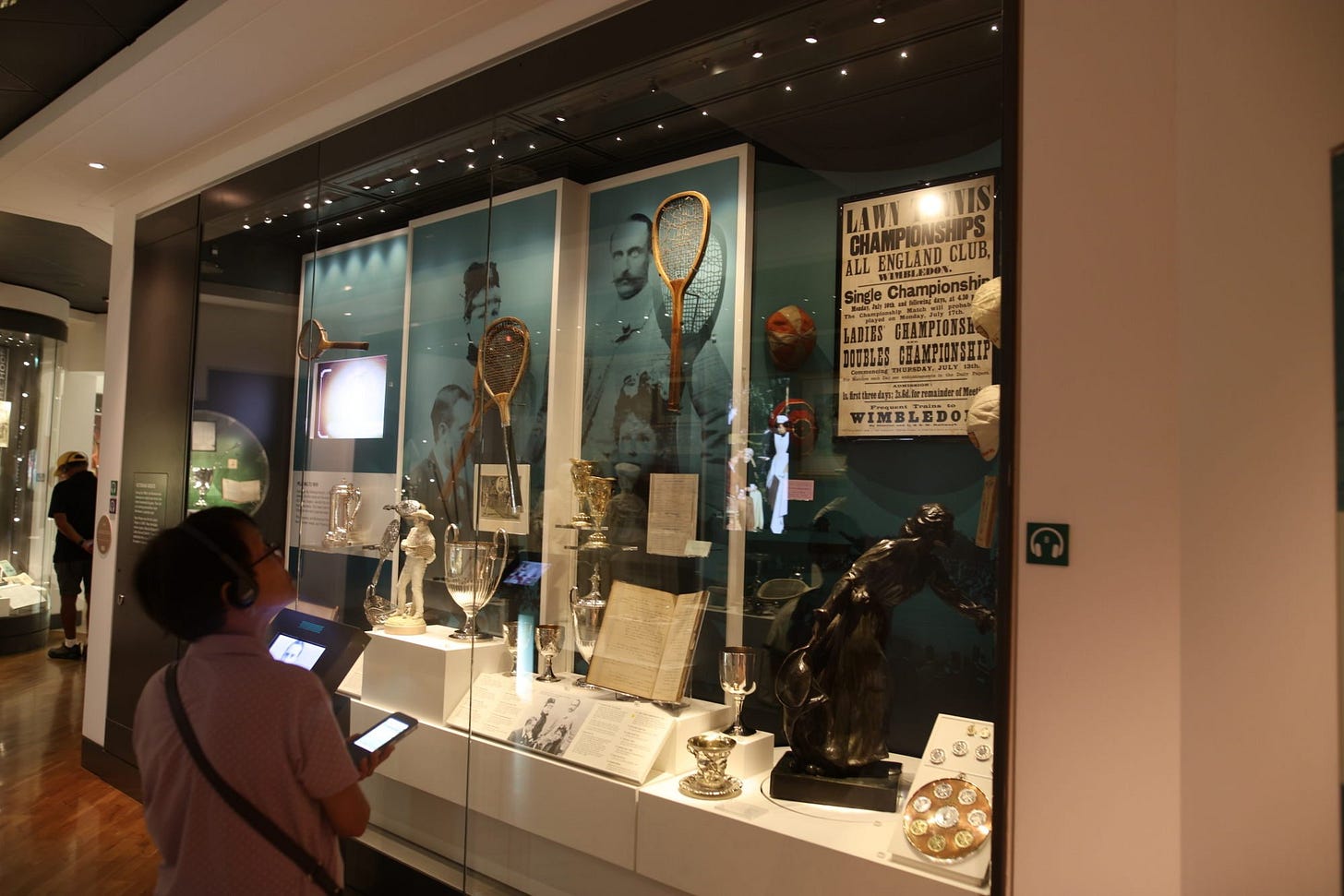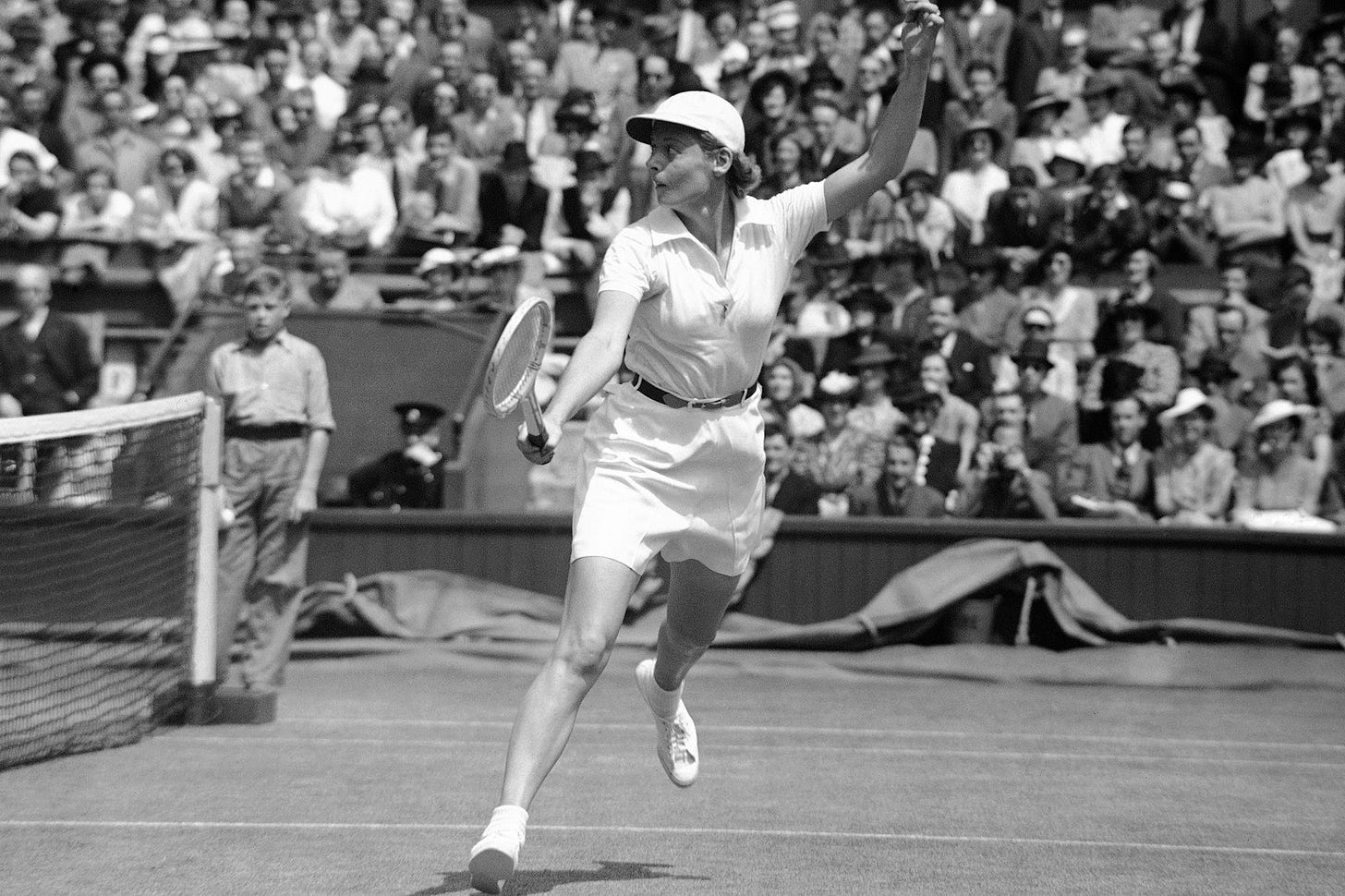Wimbledon occupies a unique place on the tennis calendar. It is one of the four slams, and yet unlike the other three, is governed by a private club rather than a national tennis federation. It projects an aura of exclusivity, one which is frequently criticised for being elitist. It was the first slam, and it likes to remind you of that fact. The grounds are manicured in a way reminiscent of an English garden party, with fans encouraged to picnic on Henman Hill. The lush greens which fill the grounds contrast with the ultra-modern greys of Roland Garros, or the concrete playground that is Flushing Meadows. A museum on the grounds ties Wimbledon’s legacy to the very beginning of lawn tennis, back when it was a simple Victorian curiosity rather than a billion dollar industry. As far as Wimbledon is concerned, it is tennis, and it wants you to know.
There has been endless discourse on Wimbledon’s elitism: whether the tournament ought to be done away with, whether fans themselves are elitist, whether the traditions are outmoded. I feel I’ve rather poorly articulated my view on the matter, because, well. It’s complicated! Far too complicated to distil into a few quippy tweets, certainly. I therefore want to try and explain the particulars of what elitism even constitutes in the context of Wimbledon, and where these attitudes come from. The context from which Wimbledon’s exclusive traditions arise are just as critical to understanding if the slam is elitist as the more tangible factors (like ticket acquisition or its exclusive dress code) that we experience as fans.
This is a topic I’m nervous to write about. For one, being political on main is always scary. It’s opening yourself up to upsetting a lot of people, which hopefully I don’t do with this piece. So, as always, if you have anything you disagree with, I’m always open to dialogue about it! That’s kind of the point of writing anything in the first place. I want to stress that this is just my perspective on the ways in which I view Wimbledon as tied to a particular kind of class system within the U.K., but as always this is just my opinion. It’s totally ok—and in some ways I encourage you—to disagree with me!
In order to investigate if and how Wimbledon can be considered an “elitist” institution, I will first explore what elitism even constitutes in the British cultural context. I then tie tennis into this particular history, explaining how tennis is connected with British class in general. I explain this in relation to Wimbledon–the slam has a conflicted identity because it is a product of a culture with a conflicted identity. I then articulate what can be done about this elitist identity, asserting that a boycott or unnuanced censure of fans actually perpetuates Wimbledon’s elitism more than a more culturally sensitive approach.
Post-Colonial Melancholia
I think Wimbledon discourse thus far has failed in part due to its misunderstanding of how elitism and class might function in different societies. In order to be “elitist,” there must be an “other” that one is excluding. However, I have found that previous dialogue about Wimbledon’s elitism has proceeded through primarily an American political lens. This is an issue for properly examining Wimbledon’s racial and class politics, as what constitutes “otherness” is dependent on particular cultural contexts. Therefore, a different approach to understanding Wimbledon will be required. In this section I aim to establish what the “elite” and the excluded “other” constitutes within a British political lens.
The American conception of what “otherness” constitutes is strongly informed by its experience as a settler colony–an experience the UK, being the heart of the empire itself, lacks. What shocked me the most when I moved to the UK is that it is a nation thoroughly haunted by its own past. In the United States we constantly discuss our past and the misdeeds involved. Perhaps we have a general sense of decline–I’ve not met someone who is unironically and uncomplicatedly patriotic in years–but this sense is not all pervasive. Our conversations are about whether we deserve to have our global influence, not if it exists at all.
The UK is different. When I moved to England I realised I’d arrived in a place where the present has adopted the texture of a simulated past. Just as a top flight tennis player might have an identity crisis upon a career ending injury, a nation which perceives itself as a global power might have an identity crisis upon the realisation of its own decline. Through much of the Victorian era, the UK perceived itself as a top flight global power, if not the global power. However, the dawn of the 20th century brought doubts as to how long this global prowess could be expected to last–doubts which crystallised through both World Wars and the subsequent restructuring of the British state in the wake of these conflicts.
In particular, the decline of the empire presents a turning point in British self-perception. It is not that there exists a complete void of events between the decline of the empire and the present–on the contrary, massive social upheaval in the form of Thatcherism and subsequently New Labour have considerably shaped the landscape. However, the ghost of past imperial aspirations continues to hang over the place like a mist that cannot be fully grasped but is equally impossible to ignore.
Paul Gilroy conceptualises these ghosts of imperialism past as “postcolonial melancholia.” Post-colonial melancholia is therefore a fantasy of maintaining a past omnipotence, of desperately desiring the “good old days” despite the mounting evidence those days were not so good for large swaths of the planet. To Gilroy, it is the very maintenance of an uncomplicated longing for the empire which leads to a societal evasion of the difficult work of understanding the extent of colonial atrocities. This is the very work which is required to build the modern multicultural society that Britain desires to be. Thus, postcolonial melancholia leaves the nation in a very difficult place. Its refusal to examine the past means it is functionally unable to enter the future.
Postcolonial melancholia manifests in interesting ways. It is the British obsession with the Second World War–the last gasp of the Empire’s relevance. It’s the view of change toward the present as only decline and failure, seemingly brought about by the “other.” The “other” in British society is of course those which fail to cleave with the traditional ethnic and class-based boundaries of what a homogenous prelapsarian Britain ought to be composed of. The most notable exemplification of this impulse is evident in the messaging of the Brexit campaign–the promise to liberate Britain from Europe, to restore a sovereignty derived from an imagined past in order to slow the nation’s unwelcome slide into the future.
The “other” at the heart of British society, then, are those which run contrary to the narrative of the omnipotent empire. American racial politics is dominated by discourse related to the legacy of slavery and indigenous genocide–the other is already extant within the nation itself. British otherisation operates according to a different logic, manifesting most obviously as xenophobia. Those from former colonies are shunned, their attempts to enter the heart of the empire rebuffed by draconian immigration policies like the “Hostile Environment” policy, designed to make staying in the UK as difficult as possible in order to encourage immigrants to leave. Those eligible at all for dual citizenship can have their British citizenship revoked. British exclusion therefore seeks to keep the “other” out before it can ever enter the empire’s inner sanctum.
The elitism of Wimbledon, therefore, operates according to a different logic of exclusion than that of the United States. It is an elitism tied to an attempt to maintain a fantasy of a simulated omnipotence in which who can access the spoils of the empire is tightly controlled, and any perceived future decline is wholly blamed on the “other” who dare transgress their tightly pre-determined social role within the empire. I believe the lens of postcolonial melancholia is better suited than other lenses to analysing Wimbledon’s elitism, and therefore determining solutions to work past it.
What’s Tennis Got To Do With It?
Wimbledon occupies a particular cultural role that is difficult to articulate to people that don’t live in the UK. Growing up in the United States, I lived oblivious of the US Open for almost two decades. In England, at least, Wimbledon is unavoidable. Advertisements for “Pimms o’Clock” gently remind you that there is in fact a tennis tournament happening. Sainsbury’s will roll out a shelf of strawberries and cream so you too can take part in a hallowed Wimbledon tradition from home. Wimbledon is one of the few tournaments available to watch for free on standard BBC broadcasting, so your chances of ambiently catching a match in a pub increase tenfold. To reject Wimbledon is to, in a sense, reject something at the heart of British culture.
Wimbledon is haunted by the same ghosts as the rest of Britain. The inability to let go of the past is crucial to understanding Wimbledon itself and the ghosts that it dredges up every time the tournament takes place. The sort of nostalgia that surrounds Wimbledon is of an off colour sort, the kind of feeling you have when an elderly relative tries to kiss you on the cheek but it’s too wet and you desperately want to clean your face. It is the feeling of talking to a beauty queen past her prime, who wants to regale you with the tales of the good old days which will never return no matter how hard anyone wishes they would. Wimbledon cannot forget its own past in the way England cannot allow itself to melt into the future.
Walking through the Wimbledon museum gave me the feeling I would get walking the corridors of my Grandparent’s nursing home. It was the kind of place that had pictures of residents, from when they were young. I’d be face to face with a photographed army nurse in her mid 20’s, unable to reconcile the idea that these people were now elderly–and would soon be gone entirely. The museum would carefully recline wooden rackets beside Victorian tennis-themed china, like a desperate shout that yes, this really happened. A final confirmation for the world that tennis used to exist in a particularly curated manner before time had to corrode the sport’s identity. It’s a haunting sort of melancholy, being unable to align the past and slot it into where it fits in the future.
Wimbledon first took place in 1877, firmly a product of the Victorian era. Prior to the open era, competition was reserved to amateur players only. “Amateur” today has taken on a connotation of diminished prestige in comparison to professional sports. However, during the Victorian era, amateur sports were considered more esteemed and higher class than professional sports, as it was an arena for the upper class to display its class and wealth.
It is this imagined past, of the “gentleman amateur” competing for the love of the sport itself that hangs over Wimbledon, and to an extent the rest of tennis. Tennis is itself a haunted sport, obsessed with its own glory days which have seemingly always passed. Perhaps the future isn’t what it used to be, but in the world of tennis this means never being fully able to part with the past. The spectre of the gentleman amateur will never fully be exorcised from the sport, but its grip on how we view tennis’s present only worsens when we try to pretend it doesn’t exist at all.
Through a series of imagined traditions, Wimbledon intentionally harkens back to the days of the gentleman amateur. For example, the all-white dress code is rooted in a Victorian sense of propriety, intentionally implemented to hide unsightly sweat generated by strenuous play. Most glaring is the royal involvement with the tournament, with players ideally bowing to the Royals present in the royal box and Kate Middleton presenting the trophy to the winner. Middleton is additionally the official patron of the club where Wimbledon takes place.
The culture of amateur sports in the UK is inextricably linked with the sporting culture of private schools. Amateurism meant that sporting success could be carefully guarded by the upper class–the only demographic who could afford to participate in sports without financial incentive. The adage that “the battle of Waterloo was won on the playing fields of Eton” reflects the shared thread between the values cultivated by amateur sport in the Victorian era and British colonial exploits. This relationship is continually reified by the imagined traditions Wimbledon cultivates in order to render a particular image of its imagined past.
This identity–one which reminisces on a more glamorous age of tennis, even if for a moment–strains against the modern confines in which the tournament finds itself. Unlike the Victorian era, Tennis is a money making venture. The issue is, the maintenance of an elite identity frequently clashes with the demands that a profit motive places on the sport. Profit doesn’t care who you are–as long as your wallet is open, that’s good enough. Wimbledon’s desire for prestige contradicts this ethos. It doesn’t matter how open your wallet is, as far as Wimbledon is concerned you’re going to have to queue for your grounds pass if you want into the sacred grounds. Wimbledon is, therefore, situated in a curious double bind. It desperately desires to cling to a past version of what tennis was, as evidenced by its marketing as a “traditional” slam. However, the requirements of operating as a modern business mean it must also embrace the future.
The controversy surrounding Wimbledon–with the ticketing, the restrictive dress code, the embrace of the royals, the exclusion of particular players–stems from this identity crisis which Wimbledon now faces. Wimbledon is stuck in the past in the same way the rest of the U.K. is. The inability to properly reckon with the ties each have to not only colonialism but the maintenance of a particular class system hold both the tournament and the nation back from embracing a modern multicultural future. It is therefore Wimbledon’s dichotomous identity that explains the particular way in which the slam is elitist.
How Should We Move Forward?
I have examined the cultural context which frames what “elitism” constitutes in the UK, and I’ve tied this into the particular case study of Wimbledon. I think it’s fairly obvious that I, a twentysomething ditz obsessed with tennis skirts and Starbucks, am completely unequipped to solve a problem as big as “the British attitude toward its colonial past.” However, I’d at least like to start a more nuanced conversation on potential ways we as a community can move forward with this knowledge. I feel that half the purpose of political discourse is to try and imagine a better way of doing things. Political discussions become emancipatory when we work in good faith dialogue with each other to create a better world, so I feel at least partially obligated to examine potential avenues forward from the problem I have outlined.
So, Britain is haunted and tennis is haunted, but this doesn’t particularly lend a helpful answer to the question of whether Wimbledon can be considered elitist or not. Questions like these are meant to narrow our conceptual field down, to get us to focus on a point of particular interest. Unfortunately, I think the answer is about as broad as lived experience itself. Wimbledon is elitist in the sense that we inhabit a society structured with a particular relationship with its own torrid past. This isn’t a particularly catchy rallying cry though, and can’t be summed up in a quippy tweet.
In the case of Wimbledon in particular, I think action toward a more multicultural tennis first requires a transformation of how we approach our guilt toward the empire in the first place. Gilroy discusses how postcolonial melancholia blinds us to the work required to reckon fully with imperial atrocities, and therefore release the ghosts of Britain’s past. He emphasises the importance of:
“the painful obligations to work through the grim details of imperial and colonial history and to transform paralyzing guilt into a more productive shame that would be conducive to the building of a multicultural nationality that is no longer phobic about the prospect of exposure to either strangers or otherness.”
In a sense, I think Gilroy’s attitude toward postcolonial melancholia applies to tennis as much as it does to the postcolonial politics of the United Kingdom. Presently, a sense of “paralysing guilt” prevents me from adequately exploring the elements of the sport that are less than perfect. Instead of working in good faith to diversify the sport, I find myself guilty of using my (tiny) platform to have “conversations” which resemble fandom beef much more than genuine discursive praxis. These tendencies exist because I don’t think my brain handles nuance well–either it’s all bad and problematic, or there’s nothing amiss at all.
Antithetical to good-faith praxis is the urge to wrap others in a “paralysing guilt,” to use it to score cheap points in twitter arguments. Harsh attacks like these only obscure the overarching goal–to make tennis a better sport by making it more welcoming for all, and hopefully (eventually) a site of genuinely transgressive praxis. Instead of taking things personally, I think I can stand to take a step back and move into a more pragmatic acknowledgement of the role tennis and Wimbledon play in reinforcing structural power within the U.K.
That first requires understanding the way in which tennis and power intersect, both domestically and internationally. It’s impossible to solve a problem that you don’t fully understand. With a proper understanding of the dynamics of the problem, we are better equipped as a community to put pressure on the proper organisations–Wimbledon, the ATP, the WTA and so on. A coherent understanding of the problem and coordinated action are going to be far more helpful than disjointed infighting on the internet.
Reconciliation with a haunted past is not as simple as shunning it all. English lawn tennis in general and Wimbledon in particular were the first tennis competitions to exist—in a sense, the beginnings of Wimbledon are inextricably tied to the beginnings of tennis itself. Perhaps Wimbledon is elitist, but to end our efforts to build a more diverse version of the sport with critique of Wimbledon is to ignore the intricacies of how the history of Wimbledon ties into the broader history of tennis.
If we were to hypothetically manage a mass boycott of Wimbledon to the point it was eliminated from the calendar, we would still be left with all of the systems that Wimbledon itself is enmeshed in. Tennis would continue to be an “elitist” sport, because Wimbledon’s legacy extends far beyond the tournament itself. If our issue with Wimbledon is its inability to reconcile itself with the existence of the future (vis a vis its inability to release its problematic past), simply pretending this cultural condition is nonexistent is antithetical to our aims. Instead of cutting out the past, the imagination of a new future within tennis is instead required.






